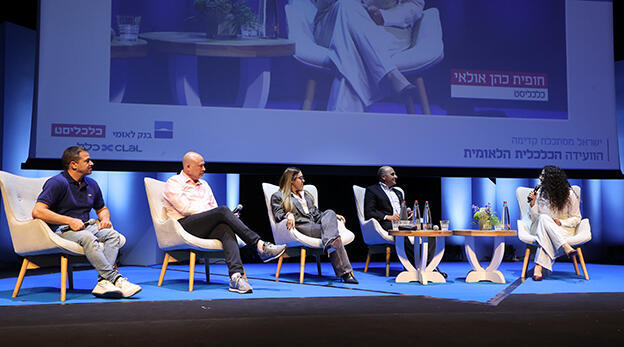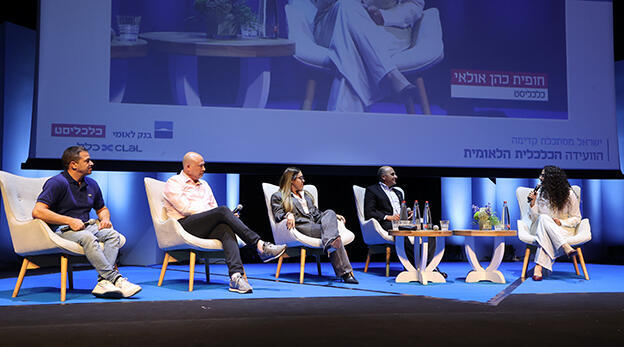
National Economic Conference
“The state must cut red tape and enable new power plants to be built faster”
Niv Sever, EVP of Edeltech, was speaking at the National Economic Conference. Mekorot CEO Amit Lang added: “The water supply was never interrupted during the war, even when facilities or electrical systems were damaged, because of the system’s high redundancy.”
“After all, we have been at war for over a year and a half, and after 12 days of war with Iran, when we went to the supermarkets, the shelves were full. There was no shortage of food, raw materials, cattle feed, weapons, ammunition, or even deliveries from AliExpress and Temu. This means we have built a resilient port infrastructure,” said Hezi Halavia, Chairman of the Israel Ports Company, at the Calcalist and Bank Leumi National Economic Conference.
“We don’t prepare for functional continuity in a single day,” Halavia said during a panel on national infrastructure during wartime. “This is a multi-year strategy that rests on three foundations. The first is strategic redundancy: we have a multi-port system, with the old ports in Ashdod and Haifa and the new ports as well. Even if one port is damaged, there are others. The second foundation is physical and technological resilience: we have invested hundreds of millions in infrastructure, defense, and cyber protection. The third element is human capital: the workers at the ports are patriotic, they come in for shifts under fire, and they understand the magnitude of the responsibility on their shoulders.”
Amit Lang, CEO of Mekorot, also spoke about the company’s performance during the war: “Mekorot is the water supply company with the highest resilience in the world. We have to cope not only with security challenges but also with drought and extreme climate events, both in winter and summer. We manage this thanks to our excellent workforce, advanced technology, and extensive command, control, and remote operation systems. The system is built in layers upon layers, with significant redundancy. We are not reliant solely on the electricity company, we also have solutions for situations without power. That’s why the water supply was never interrupted, even when facilities or electrical systems were damaged, because of the system’s high redundancy. Mekorot invests 1.5 billion shekels every year in ensuring this resilience.”
According to Lang, “The war also exposed the limitations of the system. Israel has enough water, but it does not have enough infrastructure. The north, the valley, and the Arava are still not connected to the national water system. If we continue like this, in a few years we’ll find ourselves dumping desalinated water back into the sea instead of delivering it to those who need it. The solution is clear: accelerate investments and gradually increase the company’s development budget by the end of the decade, which currently stands at about 1.5 billion shekels a year. Such a move would help strengthen settlements, preserve agriculture, and ensure water security for future generations.”
Yodfat Afek Arazi, Chairwoman of the NTA, spoke about converting light rail stations into shelters during the war with Iran: “On June 13, when the operation began, it was clear to us that this had to be done as quickly as possible because it was about saving lives. According to the division of responsibilities, this should have been the local authorities’ job. But we saw what they were up against and realized we couldn’t wait, we had to step in.
“The first decision was to put the train cars underground, this was done within hours. The second was to operate the stations as shelters ourselves. We had to see how many people were coming, and whether their needs were being met. Workers provided water, food, portable chargers, and mattresses. In the first few days, we took responsibility ourselves, and very quickly the Home Front Command and local authorities joined, working together as one team. Emergency preparedness is not a matter of a day or two. We are dealing with projects that will take years, and the story is not just about technical planning but about an organizational culture of flexibility and adaptability.”
Niv Sever, EVP of Edeltech, commented on the future resilience of Israel’s electricity supply infrastructure: “The government’s current approach needs a serious reset, not only because of the threat from Iran, which we’ve apparently addressed, but because of the real strategic competition coming from the U.S. and Europe. The competition is with the world’s major electricity producers. They are all preparing for the next big thing: artificial intelligence and the enormous energy demand it brings, especially for the high-tech sector. We underestimate the scale of this demand in Israel.
“Our competition is with foreign manufacturers who need two scarce resources: contractors to build power plants and turbines for those plants. Without turbines, nothing happens. Turbine contracts for 2030 have already been signed — if you want to build a plant for 2032, you need to secure a turbine contract now. This is a global race for a limited resource, and if the economy doesn’t act, there won’t be enough power plants here. The state must cut red tape and enable new plants to be built faster.”
According to Sever, there is no problem of market concentration in electricity: “We are supposedly the largest private player in the market, but in reality, we hold less than ten percent of the gas-based electricity generation capacity, and even less of total generation capacity. The claim of market concentration is a fiction promoted by interested parties. Our real market share is about half of what is publicly claimed. We’re seeing signs that regulators are beginning to understand that the way market share is measured needs to change.”
Halavia added: “Israel’s ports are a vital anchor for national resilience and the economy, as 99% of Israel’s international trade passes through them.” Halavia noted that a long-term strategy has enabled Israel to ensure functional continuity and avoid shortages even under extreme scenarios.
Israel’s port resilience is based on three key elements:
- Strategic redundancy: Moving from two ports to a multi-port system (Haifa, Ashdod, the Gulf, the South, and Eilat) ensures there is no single point of failure and guarantees an open gateway for Israeli trade.
- Technological and physical defenses: Heavy investments in physical protection and advanced cyber defense, with an understanding that today’s wars are also fought in the digital domain.
- Human capital: The IDF and port company workers understand the weight of their responsibility, both in long-term planning and in providing service under fire.
Beyond resilience, Halavia emphasized that geopolitical shifts, from threats like the Houthis in the Red Sea to opportunities like the Abraham Accords, create an unprecedented strategic moment for Israel. The answer is to transform Israel from a “logistical island” into a “strategic land bridge.” The goal is to offer a safe, fast, and efficient alternative to the Suez Canal by developing a “land corridor” through which goods can reach Israel’s Mediterranean ports, then cross by rail and truck to the Gulf states via Jordan. In this way, Haifa and Ashdod will become the preferred gateway for Jordan and the Gulf, solidifying Israel’s position as a major Middle East trade hub.














